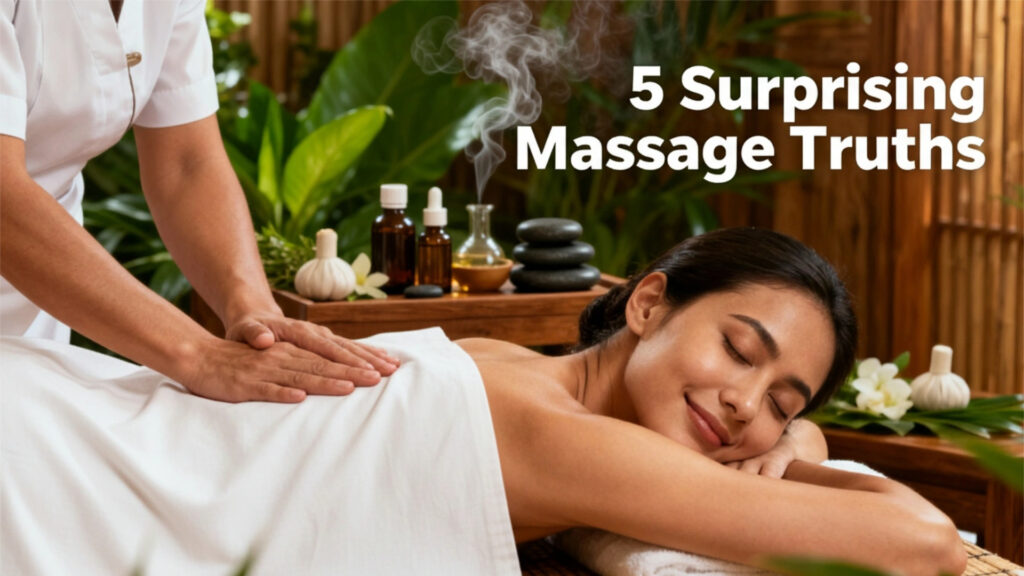Beyond the Spa Music
When most people picture a massage, they imagine soft music, dim lights, and maybe a hint of lavender in the air. But first-timers often feel unsure. Should you talk? What if you fall asleep? Are you “doing it right”?
This guide, “5 Surprising Massage Truths You Need to Know,” clears up those doubts. Below, you’ll find five little-known insights that will help you enjoy and benefit from your next massage. Whether you’re booking your first appointment or you’re a regular, these tips will help you feel more confident and relaxed.

1. Sometimes Massage Isn’t the Best Option
Massage isn’t always the right choice. Certain conditions require you to skip or modify a session—this is called a contraindication. Being honest on your intake form allows your therapist to keep you safe and avoid complications.
Here are a few surprising reasons you might need to avoid or adjust your massage:
- Recent cosmetic treatments (Botox, fillers, peels): Pressure can move fillers, bruise tender skin, or worsen swelling. Waiting the recommended time after a procedure keeps your results intact.
- Active autoimmune flare-ups: When your body is already inflamed or fighting illness, massage may irritate tissues or drain your energy further.
- Long COVID or post-viral fatigue: These conditions can make nerves and muscles extra sensitive. A heavy session may worsen pain or exhaustion.
- Blood clot risks (DVT): Massage can dislodge clots and lead to emergencies. Always share your health history.
A skilled massage therapist will adjust pressure, techniques, or even decline treatment when necessary. This isn’t rejection; it’s prioritizing your safety.
2. Your Job Is to Relax
One of the hardest things for many people during a massage is to do nothing. You may feel the urge to “help” by moving your arms or holding yourself in position. But resisting that urge is key.
Your muscles are easier to work on when they’re soft and loose. Trying to help, holding tension, or anticipating the therapist’s moves can actually make their job harder.
If your therapist needs you to move, they’ll gently guide you. Otherwise, breathe deeply, let your muscles go slack, and imagine your body melting into the table. In a world where we’re always doing something, learning to be still is part of the therapy.
3. “Embarrassing” Body Reactions Are Normal
Deep relaxation can trigger natural body responses. Massage therapists have seen it all, and nothing you do will shock them. These reactions are signs your nervous system feels safe and is letting go.
Common examples:
- Falling asleep: This is the ultimate compliment to your therapist. Your body is fully embracing the relaxation process.
- Snoring: Therapists aren’t bothered; they know it means you’re deeply relaxed.
- Drooling: Face-down relaxation plus gravity makes this common. No big deal.
- Passing gas: As your body relaxes, so does your digestive system. It’s a natural function, and your therapist is unfazed.
Remember, massage therapists are professionals focused on your well-being. They’ve seen all of these responses before and view them as normal parts of the human experience.
4. Speak Up for the Best Experience
Great massages are a two-way conversation. Many people stay silent because they don’t want to “bother” the therapist, but communication is not an interruption—it’s essential.
You can (and should) speak up about:
- Pressure: Too much or too little
- Temperature: Room too cold or too hot
- Music volume: Too loud, too soft, or a different style
- Needing a break: Bathroom trips or to adjust your position
Most therapists are grateful for feedback because it helps them tailor the session to you. They’re skilled professionals but not mind readers. Providing honest feedback transforms a standard massage into a truly customized and healing experience.
5. Soreness the Next Day Can Be Normal
Waking up sore after a massage—especially a deep tissue session—can be surprising, but it’s often normal and even beneficial. Think of it like the soreness after a challenging workout. Deep tissue work breaks up muscle knots and adhesions in tissues that may have been tight for a long time.
This process can create temporary, localized inflammation as the body begins to heal and repair, leading to that familiar “good sore” feeling. However, sharp pain during a massage is not normal—tell your therapist immediately if you feel anything beyond mild discomfort.
Aftercare tips to maximize benefits:
- Hydrate: Drink plenty of water after your session. This helps your body flush out metabolic waste released from your muscles.
- Ice: Apply an ice pack to any tender area to reduce swelling and soothe soreness.
- Gentle movement: Light stretching or walking can help your muscles recover faster.
Conclusion: Make Every Massage Work for You
Massage is more than a luxury; it’s a proven way to support your health and well-being. By understanding when to skip a session, learning how to relax, accepting normal body responses, speaking up during your treatment, and practicing simple aftercare, you’ll get the most from every visit.
When you approach massage as a partnership with your therapist, you unlock deeper relaxation, faster recovery, and better results. With these five truths in mind, you can book your next appointment with confidence and enjoy all the benefits massage has to offer.
 Ramon Mascarenas is the owner of PalmLeaf Massage & Wellness. Jen Mascarenas is his wife and a vegan who believes in a whole-food, plant-based diet to promote vitality. She shares vegan recipes and writes abstract research articles for PalmLeaf Massage & Wellness. Ramon Mascarenas and his associates have licensed massage therapists who practice Myofascial Trigger Point Therapy and other medical massage modalities. Their services expanded along with Acupuncture, Chiropractic Care and Cryo Body Sculpting to promote wellness and help clients with pain management through self-care exercises.
Ramon Mascarenas is the owner of PalmLeaf Massage & Wellness. Jen Mascarenas is his wife and a vegan who believes in a whole-food, plant-based diet to promote vitality. She shares vegan recipes and writes abstract research articles for PalmLeaf Massage & Wellness. Ramon Mascarenas and his associates have licensed massage therapists who practice Myofascial Trigger Point Therapy and other medical massage modalities. Their services expanded along with Acupuncture, Chiropractic Care and Cryo Body Sculpting to promote wellness and help clients with pain management through self-care exercises.
Book now at https://palmleafmassage.com. If you have any questions, please call us at 847.961.4800





